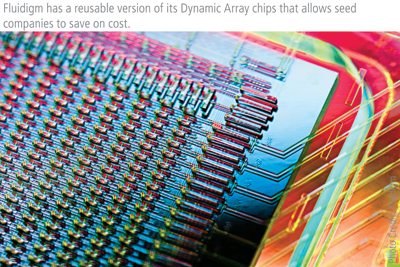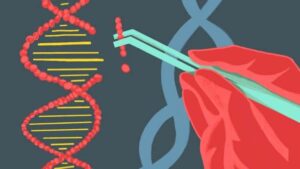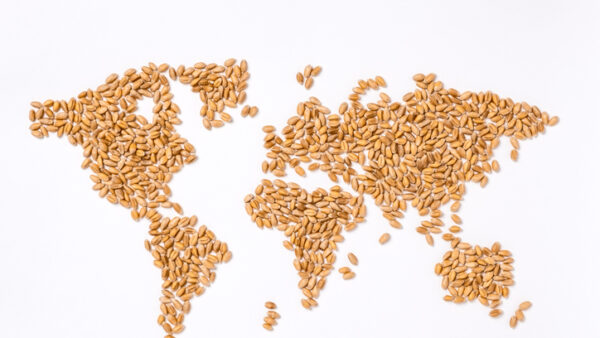New Tools Speeding Genetic Progress
New lab-based businesses supporting the seed industry are helping lighten the workload.
The seed industry is benefitting from an explosion of lab-based businesses which provide traditional and specialized services, including the use of genomics, molecular marking and other new tools that are helping to speed up genetic progress in both grain and vegetable crops.
Faster Variety Development
Mark Massoudi of California-based Ag-Biotech reports that his company is transitioning to SNP technology (single-nucleotide polymorphism), which is much quicker in determining DNA sequence variations. “This system lets us get results to clients in a speedy manner. Using this marker-assisted selection process enables breeders to more quickly rogue out undesirable plants,” says Massoudi, adding, “We just began using this technology and everything looks great.”
Quicker development of improved varieties is a primary mission of Ag-Biotech. “Our technology streamlines the breeding program with gene-specific marker evaluations. We also solve complex trait issues by enabling start-to-finish marker tracking,” explains Massoudi.
Instead of the usual five or six backcrosses, using SNP technology, his firm can “fast track” that single gene transgression in two backcrosses, producing a recurrent parent line that is 99 percent genetically identical to the original parent line.
However, the biggest value may come from the elimination of cumbersome marker-filtering steps and the need for in-house laboratory facilities. “We provide this service to any seed company. Already many of the ‘big guys’ have become customers. Our service is especially valuable with the big cash crops like corn and sorghum,” Massoudi says.
SNP genotyping in support of ag biotechnology is one of three focus areas for Fluidigm Corporation, a south San Francisco-based biotech tools company that creates microfluidic-based chips and instrumentation for biological research.
“We have three systems [BioMark HD, EP1 and Access Array] that are used for different roles in agriculture,” says Howard High of Fluidigm. “We have a reusable version of one of our Dynamic Array chips that allow seed customers to achieve lower cost and we just launched some special configurations of chips that allow customers to run many samples against a focused number of SNPs.”
The Fluidigm 192.24 Dynamic Array integrated fluidic circuit is designed to genotype 192 samples against 24 SNP assays in a single run, providing 4,608 data points in just one hour.
Trait Testing Support
DNA LandMarks Inc., based in Quebec, Canada, just introduced a new technology platform that considerably lowers the cost of testing single DNA markers. “This makes screening for specific traits much more affordable and allows breeders to increase their use of this valuable tool,” explains Charles Pick, business development manager for DNA Landmarks. “Economical, high-throughput trait screening is imperative to maintaining a competitive breeding program in today’s market.”
Traditionally, complex traits were too difficult to manage using only phenotypic evaluations. However, with DNA marker-assisted breeding these traits can be dissected down to individual genes and tracked across generations of breeding populations.
Meanwhile, Wisconsin-based BioDiagnostics, Inc. with over 12 years in the seed genetics business, provides a complete line of genetic purity, trait purity, adventitious presence and standard seed-testing services, while continuing to expanding its molecular breeding services.
“Using molecular markers and genomics to select desirable traits makes plant breeding a more precise science, and ultimately more cost-effective when compared to more traditional plant breeding methods,” says Venkatramana Pegadaraju, manager of BDI’s molecular and genomics technology department. “At BDI we work closely with our customers to define the needs of their breeding programs and then tailor molecular marker services to help achieve their desired goals.”
Plant breeders can benefit from BDI services in various ways. One good example is trait introgression using marker-assisted backcrossing, which is a cost-effective program using the SNP-based VerCode technology.
“By using this system it is possible to achieve 95 percent of the recurrent parent genetic make-up within two backcross generations,” explains BDI’s Craig Nelson. “Also, BDI provides a DNA fingerprinting service to protect customer’s valuable intellectual property.” The DNA fingerprinting data can be used to create dendrograms to understand kinship relations in breeding material.
Solutions for Conventional and Biotech Traits
Providing a unique path to desirable crop traits is the patented technology developed by Cibus Global, a plant trait development firm with offices in the United States and the Netherlands. Called Rapid Trait Development System, this non-transgenic technology allows the plant to initiate its own natural changes, explains David Voss, Cibus vice president of commercial development.
In essence, Cibus can harness naturally occurring plant mutations to provide ‘seed stock’ for crop genome mapping to determine a targeted DNA sequence change. Cibus then uses RTDS technology to make those changes in a natural way.
“We can only do what can occur in nature,” says Voss. In essence, that means they’ve learned how to harness the natural mechanism within the plant to make its own natural change, also referred to as mutagenesis technology. The United States Department of Agriculture has determined that the RTDS mutation-based technology does not qualify as a transgenic action. Instead, this technology develops seed that is considered conventional.
Due to marketing issues with genetically modified crops, plus a growing concern regarding certain trait tolerance issues, there appears to be a revived interest in conventional seed stocks. And that’s no hindrance to these genetic service companies.
“Genomics itself is not a GMO technology but instead focuses on studying the genome and its variations throughout each crop,” says Pick of DNA LandMarks. “Therefore, it is well suited to non-GMO breeding programs, especially vegetable breeding. However, our technologies also complement GMO crops. For example, marker-assisted backcrossing is a key tool for rapid introgression of GMO traits from donor lines into commercial elite lines.”
Massoudi of Ag-Biotech says services can be tailored to meet any company’s needs—whether they are conventional or trait-enhanced products. “It’s not our duty to ask, ‘what are you sending us?’ Because ours is basically an information-technology service we contract with customers on their specific needs,” he says.
If a company is dealing with non-transgenic traits, than Nelson of BioDiagnostics says the company ensures genetic purity. “We have validated our trait testing procedures with all of the major trait providers. In collaboration with Brown Seed Genetics and the Association of Official Seed Certification Agencies, BDI has worked to establish the Purity Plus testing program, the purpose of which is to preserve genetic purity and identify, increase the supply, and accelerate the distribution of non-GMO seed of improved corn varieties.”
Each of these service companies is aware of the challenges the seed industry needs to overcome in the face of a growing need to feed the world population. Their particular genetic technology tool chests can be determining factors in increasing crop yields, while saving time and money.
Dick Hagen













